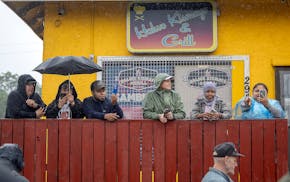As U.S. District Judge Nancy Brasel delivered the first sentence to come down in the 70-person federal food aid fraud case, she concluded that only one reason exists for a massive plot to steal money meant to feed needy children.
"At a time when the world was at its most vulnerable, you decided not to be a helper but to be a thief," Brasel told Mohamed Jama Ismail as she sentenced him to 12 years in prison Tuesday.
"I can think of no motive other than pure, unmitigated greed."
Ismail, 51, of Savage, was convicted in June of three counts — conspiracy to commit money laundering, money laundering and wire fraud — and was one of seven to stand trial in the first Feeding Our Future meal fraud case to go to trial. Prosecutors have called it one of the largest fraud schemes ever perpetrated in Minnesota — and "the single largest COVID-19 fraud scheme in the country."
Ismail co-owned Empire Cuisine & Market in Shakopee alongside co-defendant Abdiaziz Farah, whom prosecutors called the scheme's ringleader. In total, Ismail and his co-defendants were found responsible for more than $40 million in fraud proceeds on the backs of phony invoices, rosters of made-up children's names and improbably high meal count forms.
Prosecutors said that Ismail personally took home more than $2 million from the scheme in one year. From November 2020 to January 2022, he withdrew $170,000 in cash from ATMs, bought more than $11,000 in firearms and accessories and used more than $130,000 of the money to pay off his home mortgage. Ismail also sent more than $400,000 to China and owns real estate in both Kenya and Somalia.
Assistant U.S. Attorney Joseph Thompson argued that Ismail would "leave prison a wealthy man" based on the many assets he stashed out of the U.S. government's reach.
Ismail was also previously convicted and served a seven-month jail sentence for passport fraud committed after agents searched his home as part of this investigation in January 2022. Ismail and Farah, their respective passports having been seized, lied on application forms to falsely claim that they lost their old travel documents. FBI agents later arrested Ismail at Minneapolis-St. Paul International Airport in April 2022 as he attempted to board a flight bound for Kenya.
Brasel's sentence considered the seven months already served for Ismail's passport fraud conviction. That would align Ismail's total prison term with the 151-month sentence requested by prosecutors. Ismail's attorney, Patrick Cotter, urged Brasel to sentence his client to no more than 78 months.
"It doesn't feel like it was individualized," Cotter told reporters after Tuesday's nearly two-hour hearing. "He feels that this is very much more about sending a message than anything else."
Cotter said that he was certain that Ismail would appeal his sentence but was less sure whether he would be involved in further representing him.
Ismail will also be on the hook for a restitution order of nearly $48 million.
In brief remarks to Brasel before the judge read him his sentence, Ismail tearfully told her he was "not a bad person. I'm just a family man." Cotter later placed a hand on Ismail's knee to comfort him as Brasel delivered her judgment in his case.
Farah was one of six men and one woman who faced an extensive trial earlier this year. They were accused of claiming federal reimbursements for serving 18 million meals at 50 food sites across Minnesota, from Rochester and Owatonna to St. Cloud. Feeding Our Future and the St. Paul nonprofit Partners in Nutrition oversaw the sites.
Farah, 35, was found guilty of 23 crimes; Ismail was convicted on three counts; Abdimajid Mohamed Nur, 23, was convicted on 10 counts; Mukhtar Mohamed Shariff, 33, was convicted on four counts; and Hayat Mohamed Nur, 27, was convicted on three. Farah's brother, Said Shafii Farah, 41, and Abdiwahab Maalim Aftin, 33, who started a Minneapolis wholesaler, were found not guilty.
In making his case for a lengthy sentence for Ismail, Thompson argued that a sentence of just a "few years" for stealing tens of millions of dollars would encourage troves of others to repeat the conduct of those charged in this case.
Thompson also hearkened back to the early days of the 2020 COVID-19 pandemic, contrasting images of empty streets and families staying at home to try to protect their loved ones from disease with the actions of those charged in this case.
"When they saw a global pandemic, they didn't see an opportunity to come together and protect their fellow citizens, they saw an opportunity to get rich," Thompson said.
The trial was the first in a broader FBI-led case that charged 70 people in Minnesota with stealing $250 million from federal food programs.
The biggest indictment in the case involves Feeding Our Future executive director Aimee Bock and 13 other defendants tied to Safari Restaurant in Minneapolis, the largest participant in the meal programs in the investigation. Bock is due in court Wednesday for an initial appearance that will address an alleged violation of her pretrial release conditions. According to court documents, Bock took out a new line of credit for a $185,394 student loan this year that was not reported to or approved by the federal probation office.
Multiple members of the jury that convicted Ismail attended Tuesday's sentencing hearing.
Brasel invoked the feedback of one woman who was not on that jury, a health worker so angry over the allegations that Brasel excused her because she could not be impartial. Brasel recalled hearing the woman describe working "for chump change" in a nursing home during the worst months of the deadly pandemic.
"She had to watch as people like you, who instead of helping people, took advantage of the system," Brasel told Ismail.

Five members of Minneapolis Highs street gang found guilty of racketeering conspiracy

Midea recalling 1.7 million of its popular air conditioners due to mold concern

Social media, text chains helped anti-ICE protesters get the word out during Minneapolis raid

TSA agents seize two loaded guns on the same day at MSP Airport
